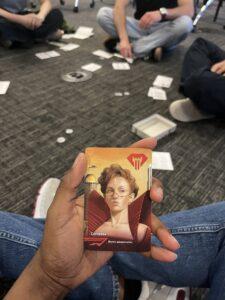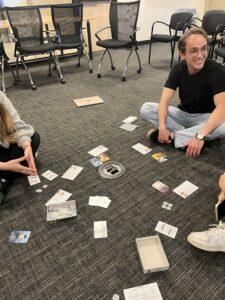Name of game, creator, platform, target audience:
The board game “Coup” by Indie Boards & Cards has an intended audience of people aged 13+ who enjoy social deduction games.
Formal elements
“Coup” is a 2-6 player game where players aim to have the most influence (face-down cards) at the end. Players start with 2 cards and coins to perform actions like a coup or assassination. Bluffing is allowed, and players lose when they have no cards left. The game ends when all but one player has been eliminated. The game needs 15 character cards, 50 coins, and a rulebook and can be played on any flat surface.

Intended fun
However, “Coup” differentiates itself from other social deduction genre games, such as One Night Ultimate Werewolf, by having no period of dormancy and less incentive to reveal one’s role unless called out. It’s one player against all others at any point in time, and removing other players is not done secretly, unlike in other games where more known roles narrow down the pool for the opposing team.
The game intends to provide players with the fun of fellowship and competition, created by hiding roles (or bluffing) and collaborating with other players to expose their facades while picking coins, exchanging cards, blocking player actions, and removing other players (by coup or assassination). The deception aspect of the game is reinforced through bluffing, allowing players to carry out plans as long as other players do not call them out and risk losing their cards.
The game employs graphic design decisions such as making every card on its back look the same, preventing any unfair advantage in deciphering roles and enhancing deception.



Commentary
When playing “Coup,” I noticed that players tended to hoard coins to avoid becoming targets. Assassination added moments of tension and excitement, but quickly led to a cycle of revenge. Thankfully, the game allows players to block others’ actions, preventing excessive bullying and abuse.
Although “Coup” effectively delivers the joy of camaraderie among players through collaboration in exposing players, the competitive aspect may not be engaging if the group lacks competitive individuals. When played purely for social interaction, without the ambition to outperform others, the experience can become monotonous rather quickly. Social players might be content with the game’s repetitive nature, inadvertently prolonging its duration.
To address this, incorporating mechanics that compel more players to make strategic choices instead of relying solely on their coin resources could add tension and rivalry to the game. More characters could have default actions that they have no choice but to perform, aimed at causing conflict with other characters.
Additionally, “Coup” could benefit from more incentives to murder, as the game can become slow-moving and dull if players only focus on building wealth without eliminating or causing chaos for other players. For example, a rule could permit the next player to assassinate the previous if the previous does not stage a coup after seven coins (instead of 10, for which there are no repercussions).



